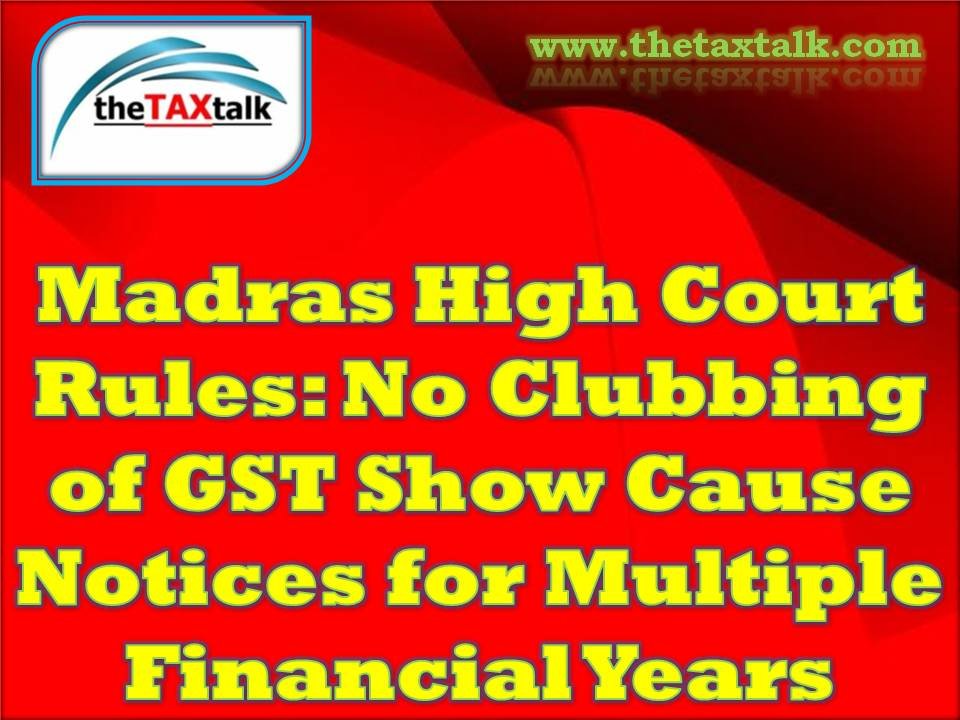![]()
Madras High Court Rules: No Clubbing of GST Show Cause Notices for Multiple Financial Years
In a landmark decision with far-reaching implications for GST litigation, the Madras High Court has quashed a composite Show Cause Notice (SCN) issued for multiple financial years, ruling that such “bunching” is impermissible under GST law.
The ruling, delivered in W.P.No.17239 of 2025 by Hon’ble Mr. Justice Krishnan Ramasamy, clarifies that each financial year must be assessed independently, and no consolidated SCN can be issued covering more than one year.
What Triggered the Dispute?
The petitioner, Ms R A and Co, was served a single show cause notice and consequential assessment order covering six financial years (2017–18 to 2022–23). The total demand raised exceeded ₹30 crore.
The petitioner argued that:
• Section 73 and 74 of the CGST Act mandate independent noticesfor each financial year.
• Clubbing notices curtails the assessee’s ability to:
-
- File year-specific replies.
- Avail amnesty schemes selectively.
- Opt for compounding under Section 138.
• The bunching was done toward the end of the limitation periodfor FY 2017–18, thereby rushing the response timeline even for later years.
Legal Crux: What Did the Court Say?
“Tax Period” = Monthly or Yearly – Not Beyond That
The court interpreted Section 2(106) of the CGST Act, defining “tax period” as the period for which a return is required-monthly or annually. Therefore, any SCN must correspond to a defined return period.
Takeaway: There is no legal basis for issuing an SCN covering multiple financial years.
Limitation Is Year-Specific
The Court emphasized that:
• Under Section 73(10)and 74(10), the time limit to issue orders is 3 or 5 years from the due date of the annual return for that specific year.
• Thus, the limitation is not continuous or cumulativeand must be enforced separately for each FY.
Judicial Support for Petitioner
The Court reinforced its view by citing:
• Titan Company Ltd. v. Joint Commissioner of GST (2024)– holding bunching of SCNs to be impermissible.
• Tharayil Medicals (Kerala HC)– mandating separate SCNs for each assessment year under Section 74.
• Caltex (India) Ltd. (SC – AIR 1966 SC 1350)– holding that each assessment year is an independent taxing period.
Department’s Argument-and the Rebuttal
The Revenue argued that:
• There is no express bar in Sections 73 or 74 against issuing a combined notice.
• The phrase “any period” in the Act could include multiple years.
However, the Court clarified that “any period” must be read within the boundaries of a tax period, which cannot stretch beyond one financial year. It further noted that clubbing notices denies the assessee procedural fairness and creates litigation complexities.
Final Verdict: Key Court Directions
The Madras High Court laid down these binding principles:
1. Show Cause Notices must align with tax periods— either monthly or annually.
2. Composite notices for more than one financial year are illegal.
3. Separate assessment orders must be passed for each FY.
4. The impugned order was passed without jurisdictionand is therefore quashed.
5. The writ petition is allowed.
Why This Judgment Matters
This decision is a significant win for taxpayers, especially those under GST audit or facing retrospective scrutiny. It:
Protects the right to reply meaningfully within statutory timelines
Enables participation in amnesty or compounding schemes for specific years
Prevents blanket liability across multiple years in a single demand
Conclusion
The Madras High Court has reinforced a core principle of GST law: each financial year is a separate taxable unit, and must be treated as such for assessments and notices. Authorities can no longer issue clubbed SCNs to save effort or time. This ruling ensures fair process, statutory compliance, and stronger taxpayer rights under GST.
Are you facing a GST audit or SCN for multiple years? Seek professional advice to ensure your procedural rights are protected.
The copy of the order is as under:

